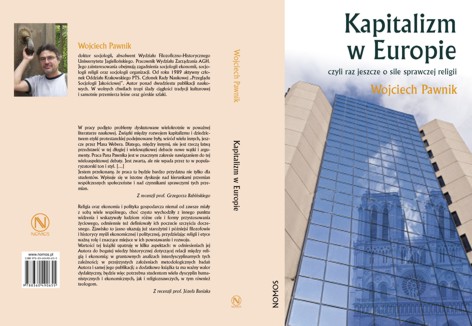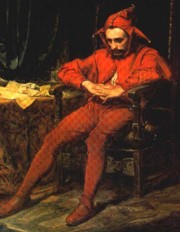Wydział Zarządzania Akademia Górniczo-Hutnicza
Katedra Zarządzania Przedsiębiorstwem
adiunkt dr Wojciech Pawnik.
Summary
Wojciech Pawnik, Ph.D. in Sociology - Capitalism in Europe - Instrumentality of Religion, Faculty of Management, AGH University of Science and Technology in Krakow
The central issue in Capitalism in Europe - Instrumentality of Religion is the identification of what was instrumental in bringing about capitalism and its recipes for social and cultural order. The search for the sources of capitalism is also a search for the identity and basic assumptions of democratic societies in and outside Europe. It is a search that probes into the essence and impact of the 18th century rationalism. It is also a search that aims at answering the question whether nowadays knowledge is becoming more and more a factor contributing to the survival of humanity. concept of rationalization - a gradual replacement of faith by rational thinking based on perception as the source of knowledge - formulated at the beginning of the 20th century by Max Weber is supposed to reflect the evolution that took place in protestant Western countries. The evolution relied on two distinct types of rationality:

rationality of aim (practical)- implying an informed and relevant choice of the best means to an aim
rationality of value (theoretical) - implying a constant search for an identified ideal
The model of rational living proposed by Weber means endurance, consistency, deferred consumption and investment. A religion that is in favour of this model is a "rational" religion. There are other two types of rationality: substantive and formal. Action is substantively rational if it brings about desired results and formally rational if it stems from true knowledge. It seems that the paradigm of economy based on knowledge is primarily bound with substantive rationality, in other words, efficiency. One could ask, however, why substantive rationality - efficiency - should be based exclusively on knowledge, not on other types of convictions, i.e. religious. What criteria make scientific rationality stand out among other types of rationality that underlie knowledge?
The crisis of Enlightenment belief in determined progress we are now witnessing seems to undermine the na?ve belief in scientific rationality. The belief was grounded in the assumption that appropriate scientific tools and methods made it possible not only to objectively describe reality but also to anticipate what was to come. assumption permeates sociology and economics, both rooted in the Enlightenment. But even if there is a great overlap between the research areas, sociology and economics have been using differing methods leading to differing aims. Despite the technocracy of economics as well as comparative and diachronic analyses of sociology only few strategic projections have come true so far. The technocracy of sciences forces researchers into thinking about reality in terms of the paradigm of scientific revolutions - sudden and abrupt shifts, both quantitative and qualitative.
The present analysis is an attempt to point out the impact of cultural and religious tradition on the formative processes that have brought about the modern homo oeconomicus, emphasizing the issue of subjectivity in its individual and collective dimensions. In Introduction the author spells out the characteristics of three distinct interpretive approaches to the notion of homo oeconomicus:
searching for the Spirit of Capitalism, in other words, for characteristic features inherent in the human psyche rather than in socio-economic structures and their transformations.
locating the origin of capitalism (including the new type of man) in a complex process of economic transformations.
emphasizing the correlation between culture (including functions of religion as its constituent element), individuals, and economic structure as constitutive elements of capitalism.
The author's assumption is that from both theoretical and historical perspectives democratic capitalism is at present the best possible manifestation of the principle of the rationality of form - the principle referring to individual and collective activity of humans. Democratic capitalism is understood as a socio-political system constituted by three autonomous and complementary orders: political order (political liberties), economic order (economic liberties), and cultural order (pluralism). Further on, the concept of subjectivity is described in detail from the perspective of psychology, social psychology, and sociology. On the assumption that all facts and social phenomena are to be seen in historical context, the author emphasizes this perspective. The underlying assumptions about the ontology of social reality and corresponding methodology presuppose that there is a cause-and-result relation that binds a cause, distant in time and the result, manifest at present. principle of substantive continuity, despite its provisionary character, allows us to account for even the most complex phenomena; and the processes underlying the rise of capitalism in Europe are undoubtedly complex.
Chapter One is a thorough analysis of the role religion played in the development of capitalism and the relationship between religion and liberal economy. The emphasis is put on the contribution of religion to the development of Weber's Homo Economicus, his attitudes and behaviour. Chapter Two characterizes the process of the institutionalization of religion against the background of the development of economy and various communities. The process is presented through reference to church understood as fellowship, community, and institution. Three is a reconstruction of the rise of the Medieval social and institutional structures based on the principles of unipolarity, universality, and commitment, best expounded by Thomas Aquinas. Those principles determined the social order, including the perception of economic order.
The last chapter is a thorough and detailed account of how the perception of social and religious boundaries of economic activities evolved. It focuses on the changes in the work organization of craft and trade as well as the origin of the merchant class and the evolution of its status - social changes that foreshadowed a new economic order. The crucial issue in the formative processes leading to Homo Economicus was the dilemma of choice between the acceptance of the institutionalization of faith and the desire to preserve the "authentic" character of the relationships within a religious community, a dilemma that had been present from the beginning of Christianity. A solution adopted at a given historical moment to overcome this dilemma delineated at the same time the area of subjectivity for community members.
